Implementing Operational Resilience for KWAP
Chapter 9
Identifying Critical Business Services: The Foundation of KWAP’s Operational Resilience

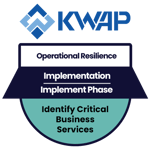
Identifying critical business services (CBS) is the first "Implement" phase stage in KWAP’s Operational Resilience Planning Methodology.
This foundational step determines which services must remain operational, even during disruptions, to prevent significant financial, reputational, or regulatory consequences.
This article explores the importance of this stage, the methodology for identifying CBS, and best practices for KWAP to ensure a resilient operational framework.
Why Identifying Critical Business Services Matters
Operational resilience begins with understanding which services are truly critical to KWAP’s mission.
A disruption in these services could:
- Impair pension fund management, affecting retirees’ payouts.
- Damage KWAP’s reputation as a reliable financial custodian.
- Trigger regulatory penalties if compliance obligations are breached.
By clearly defining CBS, KWAP can prioritise resources, implement stronger safeguards, and develop targeted recovery strategies.
Methodology for Identifying Critical Business Services
KWAP can follow a structured approach to determine its CBS, ensuring alignment with regulatory expectations (e.g., Bank Negara Malaysia’s Policy Document on Operational Risk Management).
1. Engage Key Stakeholders
- To gather insights, involve senior management, risk officers, IT, and business units.
- Conduct workshops to assess which services are vital for KWAP’s core functions.
2. Define Criteria for Criticality
Services should be classified based on:
- Financial Impact – Could disruption cause significant monetary losses?
- Regulatory Impact – Would failure lead to legal or compliance breaches?
- Reputational Impact – Could it harm KWAP’s public trust?
- Member Impact – Would pensioners or beneficiaries be adversely affected?
3. Conduct a Business Impact Analysis (BIA)
- Assess the potential consequences of service disruptions over different timeframes (e.g., hours, days).
- Identify interdependencies between systems, processes, and third-party providers.
4. Prioritise and Validate CBS
- Rank services by criticality using a risk-based approach.
- Validate findings with executive leadership to ensure alignment with strategic objectives.
Expected Outcomes
By completing this stage, KWAP will achieve:
- A documented list of Critical Business Services that require resilience measures.
- Risk-aware decision-making on resource allocation for continuity planning.
- Regulatory readiness, demonstrating compliance with financial resilience standards.
Best Practices for KWAP
To enhance the effectiveness of CBS identification, KWAP should:
- Review and Update Regularly – Business needs evolve; reassess CBS annually or after major changes.
- Integrate with Risk Management – Align CBS with KWAP’s broader risk framework.
- Leverage Technology – Use data analytics to model disruption scenarios and refine criticality assessments.
Summing Up ...
Identifying Critical Business Services is the cornerstone of KWAP’s operational resilience strategy.
By systematically assessing which functions are indispensable, KWAP can focus its efforts on protecting the services that matter most—ensuring continuity for pensioners, compliance with regulators, and long-term organisational stability.
The next stage, "Mapping Processes and Resources," will build on this foundation by analysing the dependencies that support these critical services.
| Operational Resilience in Pension Funds: The KWAP Case Study | ||||||||
| Implementing Operational Resilience for KWAP | ||||||||
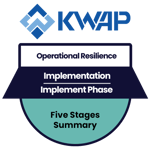 |
 |
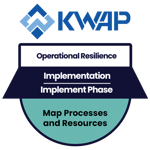 |
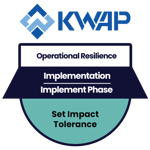 |
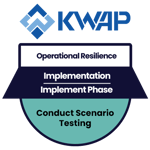 |
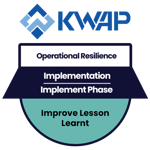 |
|||
More Information About OR-5000 [OR-5] or OR-300 [OR-3]
 To further enhance your expertise, explore the OR-5000 Operational Resilience Expert Implementer course by BCM Institute. This expert-level certification program provides the skills and strategies to build and sustain a resilient organisation.
To further enhance your expertise, explore the OR-5000 Operational Resilience Expert Implementer course by BCM Institute. This expert-level certification program provides the skills and strategies to build and sustain a resilient organisation.
The course is also claimable by HRD Corp, making it an excellent opportunity for professionals looking to upskill with financial support.
To learn more about the course and schedule, click the buttons below for the [OR-3] OR-300 Operational Resilience Implementer course and the [OR-5] OR-5000 Operational Resilience Expert Implementer course.
 |
 |
 |
 |
 |
![[BL-OR] [3-4-5] View Schedule](https://blog.bcm-institute.org/hs-fs/hubfs/hub_generated/resized/e4287b59-1a43-4e10-8e43-c73b27b3ca39.png?width=172&height=50&name=e4287b59-1a43-4e10-8e43-c73b27b3ca39.png) |
![[BL-OR] [3] FAQ OR-300](https://blog.bcm-institute.org/hs-fs/hubfs/hub_generated/resized/294e989f-8613-4bf3-96a5-a89408cfb9ca.png?width=150&height=150&name=294e989f-8613-4bf3-96a5-a89408cfb9ca.png) |
 |
|
 |
 |
 |







![Email to Sales Team [BCM Institute]](https://blog.bcm-institute.org/hs-fs/hubfs/hub_generated/resized/850988ce-aa7d-4953-95cf-797635341edd.png?width=100&height=100&name=850988ce-aa7d-4953-95cf-797635341edd.png)

